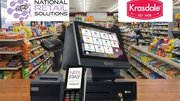Article
Kiosk executives highly bullish on 2020
2019 marked the third straight year of excellent growth for self-service technology, and most kiosk industry executives say 2020 will be just as good if not better due to rising consumer acceptance of self service.

January 6, 2020 by Elliot Maras — Editor, Kiosk Marketplace & Vending Times
Kiosk industry leaders were anxious to get back to work after New Year's Eve last week, driven by expectations of yet another year of outstanding growth fueled by rising consumer acceptance of self service. The last year was the third consecutive one for excellent growth for self-service technology, and most kiosk industry executives say 2020 will be just as good, if not better.
Sixty percent of Kiosk Marketplace readers — both operators and suppliers of kiosks — described themselves as "very optimistic" while 32% said they are "optimistic" about their business in a recent email survey. Readers attribute their optimism to a strong economy, improved consumer acceptance of self-service technology, rising demand for the technology and technological advancements.
Economic growth strong
U.S. consumer confidence remained high in the fourth quarter of 2019, according to the U.S. Conference Board. The board's index of consumer confidence hit an 18-year high of 137.9 in October 2018 and it has remained close to that mark since then.
In addition to strong consumer confidence that typically encourages businesses to invest in new products and services, the nation's historically low unemployment focused many peoples' attention on the need for self-service in business-to-consumer environments.
Outlook good for multiple verticals
Kiosk industry executives agreed that the retail, hospitality and foodservice verticals — historically among the larger clientele groups — continue to show strong growth, as do other verticals, such as financial, entertainment and gaming, transportation, health care, government and business-to-business industrial supply.
Kiosk manufacturers also pointed to rising interest in some of the newer verticals, such as electric vehicle charging stations, cannabis dispensaries, unattended convenience stores and "smart city" initiatives.
Industry leaders interviewed by Kiosk Marketplace at the end of 2019 see the market being largely driven by retailers who recognize the need for in-store technology to assist overburdened sales associates, as well as a client base that understands both the marketing muscle of interactive technology and the value of data that kiosks can provide.
"We have sales forecasts that show our sales doubling in 2020," said Chuck Lewis, vice president of Palmer Digital Group, a kiosk manufacturer. "PDG sales picked up the fourth quarter of 2019 and we don't see any indication that these sales will slow down anytime soon."
"The U.S. economy is strong and should only get stronger in 2020 with the continuation of the current tax and trade policies," said Chris Corsbie, senior director of marketing at Elatec USA Inc. a provider of radio frequency identification solutions.
QSRs, retail and hospitality strong
"PDG has a strong presence in QSR, retail and hospitality, and we see these markets growing even larger in 2020," said Lewis. "Amusement parks and auditorium/stadium are also growing markets for digital kiosks."
"Great strides were made in 2019 in the QSR and hospitality verticals, particularly in how companies utilized self-ordering kiosks to better engage with consumers," said Luke Wilwerding, senior director for North America sales at Elo, a provider of interactive technology solutions. "As well, we started to see some retailers enabling more customer interactions through kiosk technology, which is a trend that we expect to continue growing in 2020."
Wilwerding expects to see more retailers implementing kiosks for self-checkout, endless aisle and in-store pickup.
"In-store pickup, self-checkout, personalization and customization are areas of growth as retailers work to differentiate themselves," he said. "Physical stores are also transforming themselves into micro-fulfillment centers impacting back-of-house operations in 2020."
Presidential election concerns some
Some observers, such as Jeff LeBlanc, the director of user experience at Advanced Kiosks, a manufacturer of interactive kiosks and developer of self-service software and interface solutions, felt the presidential election could bring some uncertainty to business decisions this year. Most industry observers, however, do not see the election this year playing a significant role in technology spending.
"Business is business, irrespective of the tenant in the White House," said Akshay Sharma, a technical advisory board member of Grubbrr, a platform for kiosks, point-of-sale, mobile and online ordering.
"This scenario is too large to evaluate in a simple way," added Marcos Fugulin, business development director at Apek International, a kiosk manufacturer. "Some may be concerned about elections, others about increasingly fast-adapting competition and a lack of qualified professionals to ramp up the business."
U.S./China trade war ramifications unclear
Industry observers also pondered the impact of U.S./China trade tariffs. U.S. manufacturers agreed that the tariffs have delivered an increase in the cost of Chinese steel, but this has actually benefited some U.S. suppliers.
"One of the goals of trade tariffs is to encourage the repatriation of manufacturing. As that happens, and with the view that tariffs will remain for the foreseeable future, we could see kiosk hardware prices moderate in 2020," said Elatec's Corsbie.
"These tariffs have not impacted PDG negatively in anyway. In fact they have helped us," said Palmer Digital Group's Lewis. "The 'all-in-one' kiosks that are manufactured in China and supplied by many U.S.-based AV companies have had a significant price increase due to these tariffs. As a result, PDG's kiosks that are similar have now become cost-competitive. We have increased sales of this kiosk and have earned the business of many new partners who used to sell the Chinese made 'all-in-one' kiosks."
Dawn Dickson, CEO of PopCom, a provider of self-service kiosks that uses artificial intelligence to help retailers collect customer insights, agreed with Lewis.
"The tariffs on steel and importing certain materials have impacted kiosk prices, however, I believe this has driven more companies like PopCom to bring our manufacturing stateside, which can't be a bad thing," she said.
While hardware costs have increased for some kiosks, costs for standard kiosk software has declined, according to some.
"As I see it, the software segment will be promising in all (customer) segments, as the lower costs for customers allow for a broader reach in companies that already have the hardware and want to provide better experiences for their users," said Apek International's Fugulin.
Dickson thinks the outlook for self-service technology will be strong despite general economic conditions.
"Despite any economic fluctuations, people still shop and need essential items," Dickson said. "I think the overall economy will experience a shift, however, I believe small- and medium-sized businesses will continue on an upward trend."
Technology drives growth
Advancements in customer experience technology are expected to continue in 2020.
Apek International's Fugulin believes facial recognition, virtual reality, augmented reality, artificial intelligence, data analytics, simulations, Internet of Things integration and cybersecurity will all continue to expand in self-service solutions over the next decade. Observers agreed that facial recognition in particular is gaining adoption, despite concerns about personal privacy. In time, facial recognition in the U.S. could become more accepted, as it already is in China.
"We are excited about the increased use of multi-factor authentication for access control, for example, the addition of RFID or biometric authentication to PIN/password," said Elatec's Corsbie. "Managing user identification and access control are ever more important as we enter 2020. Device endpoint protection, network security and data protection are required not just to be good stewards of the products, services and information our kiosks provide, but to avoid the negative consequences and liabilities that breaches could bring."
"We are most excited about facial recognition and AI as they enable innovative opportunities to create convenient personalized experiences for customers in-store," said Elo's Wilwerding.
"I believe facial recognition in 2020 will create an 'opt-in world,' where consumers will opt-in for a retail or hospitality experience, agreeing to be identified creating a truly convenient and personalized experience," Wilwerding said. "For younger generations already accustomed to accessing the added benefits of facial identity, opting in will not be a concern for this group of future shoppers further driving adoption."
Privacy concerns have emerged in the U.S. over how police have used it to track people without consent, Dickson said. In addition, many of the facial recognition algorithms are not able to properly identify people.
"We must continue to use the machines to make them smarter, and it will take time," she said. "But soon I see Alibaba level of facial recognition coming to the U.S."
Grubbrr's Sharma is particularly excited about the advancing 5G technology. Carriers introduced 5G smartphones, which promise faster data speeds, in 2019.
"It's the year of digital transformation with 5G," Sharma said. It's e-kiosks everywhere with trials underway from smart lamp-posts with digital signage, and e-kiosks from startups like www.LB-N.com and others."
About Elliot Maras
Elliot Maras is the editor of Kiosk Marketplace and Vending Times. He brings three decades covering unattended retail and commercial foodservice.
Included In This Story
Palmer Digital Group
Palmer Digital Group specializes in indoor and outdoor digital kiosks and kiosk enclosures. Palmer Digital Group leverages 40 plus years of digital enclosure fabrication capabilities from its highly reputable parent company IEC. PDG manufactures digital kiosk solutions for virtually any industry from QSR to retail to transportation.
 ChatGPT
ChatGPT Grok
Grok Perplexity
Perplexity Claude
Claude











